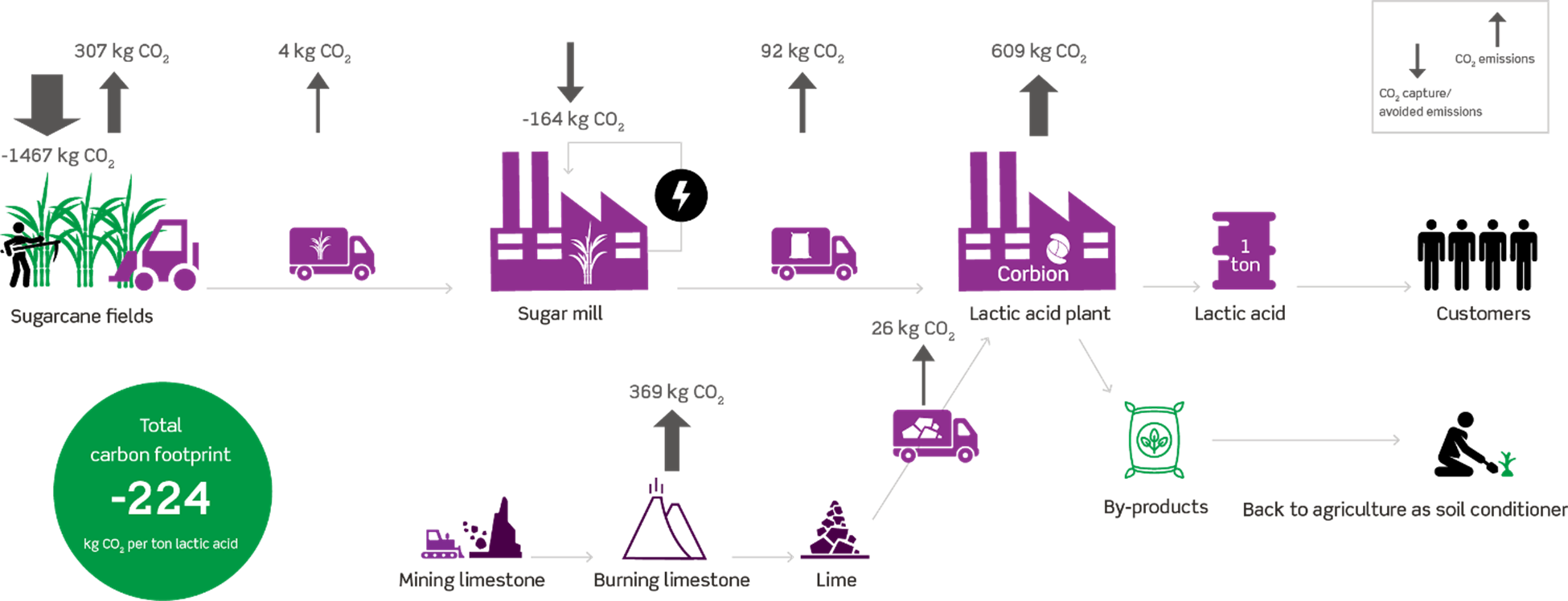What is a Life Cycle Assessment?
Life Cycle Assessment (LCA) is a methodology for the systematic and quantitative evaluation of the environmental performance of a product through all stages of its life cycle, from raw material extraction through production, use, and disposal ("cradle to grave").
An LCA can be used as scientific basis to identify improvement opportunities, to compare different products, and support decision making in new product and process development. Environmental impacts that are typically evaluated in an LCA study include greenhouse gas emissions, water use, land use, and use of non-renewable energy.
LCA at Corbion
Corbion also uses LCA to enable our customers to make conscious choices and we will conduct cradle-to-gate LCAs for all products that can contribute to preserving the planet by 2025. Using this data, we can work side by side with customers to support them on the improvement of their environmental footprint and on the substantiation of their sustainability claims.
Carbon footprint lactic acid production Thailand
We have performed an LCA for our lactic acid production process in Thailand. This LCA has been peer reviewed according to ISO 14040/44 standards*. Based on this study, we have derived LCAs for all products produced in Thailand.
The infographic below shows the total impact (kg CO2 per ton lactic acid) and the impact per step in the chain.
Sugar cane fields
During the growing of the sugar cane, CO2 is absorbed by the sugar cane plants from the air. CO2 emissions are related to direct emissions on the field due to the release of N2O during fertilizer application (N2O is a significant contributor to climate change) and to land use transformation from forest, perennial crops, or other annual crops to sugarcane. Also important is the energy consumed by farming machinery.
Sugar mill
At the sugar mill, sugarcane is crushed to obtain a sugar-rich juice which is purified into sugar. This process generates two main by-products: bagasse (the pressed sugarcane) and molasses. Bagasse is efficiently incinerated with heat and electricity production. With this energy the sugar mill is energetic self-sufficient and the electricity surplus is sold to the Thai grid. Overall this stage has a negative carbon footprint, because the production of electricity avoids the use of fossil fuels and related CO2 emissions.
Lime production
Lime is produced by burning of limestone, to convert calcium carbonate (limestone) into calcium hydroxide (lime). This process releases CO2 and therefore has a significant contribution to the overall carbon footprint.
Lactic acid plant
This stage includes the conversion of sugar to lactic acid. The main impacts on the carbon footprint are related to the energy use (electricity and steam). In the process, lime is needed to control the pH of the fermentation. The lactic acid process generates several valuable by-products, such as gypsum, which are re-used as a soil conditioner in agriculture.
LCA end-of-life options for different applications of bioplastics packaging
Together with Total Corbion PLA, we have performed an LCA to compare the environmental impact of different end-of-life options of PLA food packaging including the weight of the food waste left behind when thrown away by the user. Click here for more information.
Life cycle assessment of heterotrophic algae omega-3
To understand the environmental impacts of omega-3s produced by heterotrophic algae, a comprehensive Life Cycle Assessment (LCA), assessing six impact categories, was conducted for two algae omega-3 DHA products, in powder and liquid suspension formats.
Read article here.
* Environmental footprint of Lactic acid and Lactide from Thailand, Corbion 2017
LCA approach for Corbion's product portfolio: Lactic acid derivative plants, Corbion 2017




